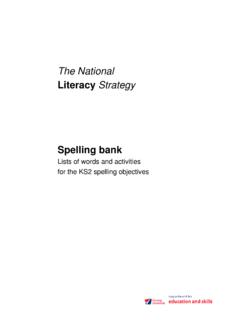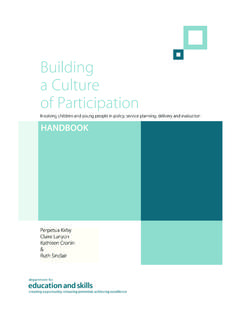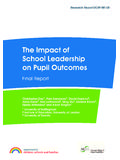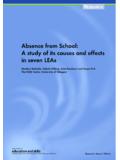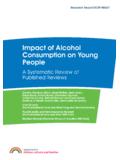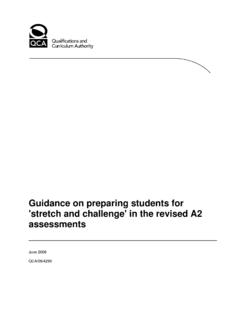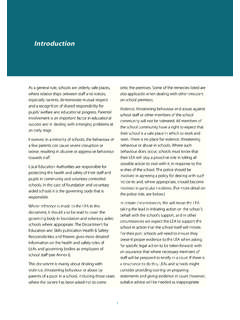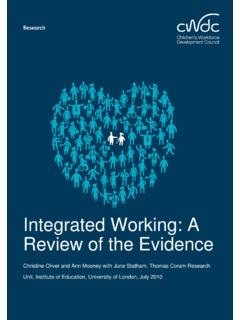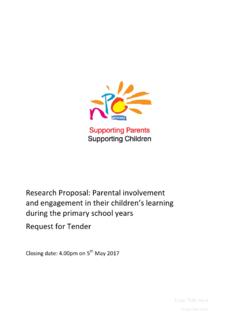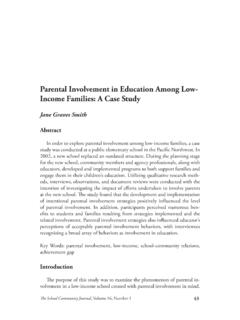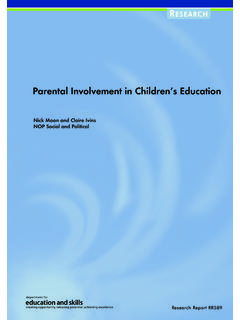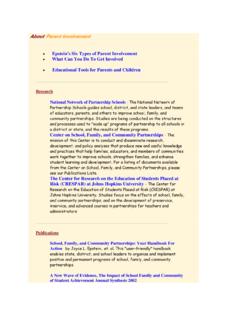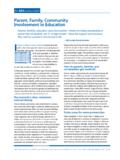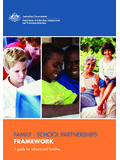Transcription of Parental Involvement in Children’s Education 2007
1 Research Report DCSF-RR034 Parental Involvement inChildren s Education 2007 Mark Peters, Ken Seeds, Andrew Goldstein andNick ColemanBMRB Social Research Parental Involvement in children s Education 2007 Mark Peters, Ken Seeds, Andrew Goldstein and Nick Coleman BMRB Social Research The views expressed in this report are the authors and do not necessarily reflect those of the Department for children , Schools and Families. BMRB International Ltd 2008 ISBN 978 1 84775 144 7 Research Report No DCSF-RR034 1 Executive Summary Background BMRB Social Research were commissioned by the Department for children , Schools and Families (DCSF) to conduct a survey of parents and carers of children , in order to examine Parental Involvement in children s Education .
2 The then Department for Education and Skills (DfES) commissioned previous surveys in 2001 and 2004. The main objective of the 2007 survey was to investigate the extent and variety of parents Involvement in their children s schooling (including comparing data with the 2001 and 2004 surveys). Summary of research method A telephone survey of 5,032 parents and carers of children aged 5-16 attending maintained schools (living in England) was carried out by BMRB between August and October 2007. Interviews lasted approximately 20 minutes on average and were conducted via Computer Assisted Telephone Interviewing (CATI).
3 The survey was based on a nationally representative sample of this group. Differences are reported only when they are statistically significant at the 95 per cent confidence level. Key findings Around half (51%) of parents felt very involved in their child s school life: this is an increase from 29% in 2001, to 38% in 2004 to 51% in the 2007 survey. Women, parents with young children , parents who left full-time Education later, those from Black or Black British backgrounds and parents of a child with a Statement of SEN were all more likely than average to feel very involved.
4 Lone parents and non-resident parents were both less likely than average to feel very involved. Similar to survey findings in previous years, work commitments were the main barrier to greater Involvement (mentioned by 44% of respondents). Parents are now more likely to see a child s Education as mainly or wholly their responsibility (28%). This represents a shift from previous years, when parents were more likely to see it as the school s responsibility. Nearly all parents (96%) agreed that it was extremely important to make sure that their child attended school regularly and on time, a finding consistent with 2001 and 2004 Around three in four of all parents felt that it was extremely important to help with their child s homework, a similar proportion to previous years.
5 Further, the 2same proportion said they felt confident always or most of the time when helping their children with homework; the proportion who said they are always confident has fallen a little since 2001. Informal discussions with school staff were seen as the most useful way of finding out about children s progress in school (28% found them the most useful method). In previous years of the survey, parents evenings had been seen as the most useful means of communication. Summary of Findings Overall Involvement and responsibility Around half (51%) of parents felt very involved in their child s school life: the proportion who said they were very involved has increased from 29% in 2001, to 38% in 2004 to 51% in the 2007 survey.
6 Women, parents with young children , parents who left full-time Education later, those from Black or Black British backgrounds, parents of a child with a Statement of SEN were all more likely than average to feel very involved. Lone parents and non-resident parents were both less likely than average to feel very involved. In two-parent households, it was common for both parents to share some Involvement in their child s school life, although women tended to feel more involved than men (53% compared with 45% felt very involved).
7 Two in three parents said that they would like to be more involved in their child s school life. Although this is slightly lower than in 2001, this reflects the fact that parents now feel that they are more involved. Those who said they felt uninvolved in their child s Education were more likely than those who said they felt involved to desire greater Involvement (73% compared with 65%). Similar to survey findings in previous years, work commitments were the main barrier to greater Involvement (mentioned by 44% of respondents).
8 Parents attitudes to educational responsibility Parents are now more likely to see a child s Education as mainly or wholly their responsibility (28%). This represents a shift from previous years, when parents were more likely to see it as the school s responsibility. Non-white parents were most likely to say it was the parent s responsibility rather than the schools. Nearly all parents (96%) agreed that it was extremely important to make sure that their child attended school regularly and on time, a finding consistent with 2001 and 2004.
9 3 Around a half (48%) of parents said that they would be happy to take their child out of school during term time (for example to go on a family holiday), and this did not vary by the level of Involvement the parents had in their child s school life. Parents were more reluctant to do this if their child was in year 10 or above (35% would be happy to do so). These findings are consistent with findings from previous surveys (46% and 49% said they would be happy to take their child out of school in 2004 and 2001 respectively).
10 Involvement with the child s Education One in three parents (32%) said they help their children with their homework every time, while a further 26% do so most times. This represents a slight increase on previous years figures. Around three in four parents felt that it was extremely important to help with their child s homework, a similar proportion to previous years. Three in four of all parents said they felt confident always or most of the time when helping their children with homework; the proportion who said they are always confident has fallen a little since 2001.


